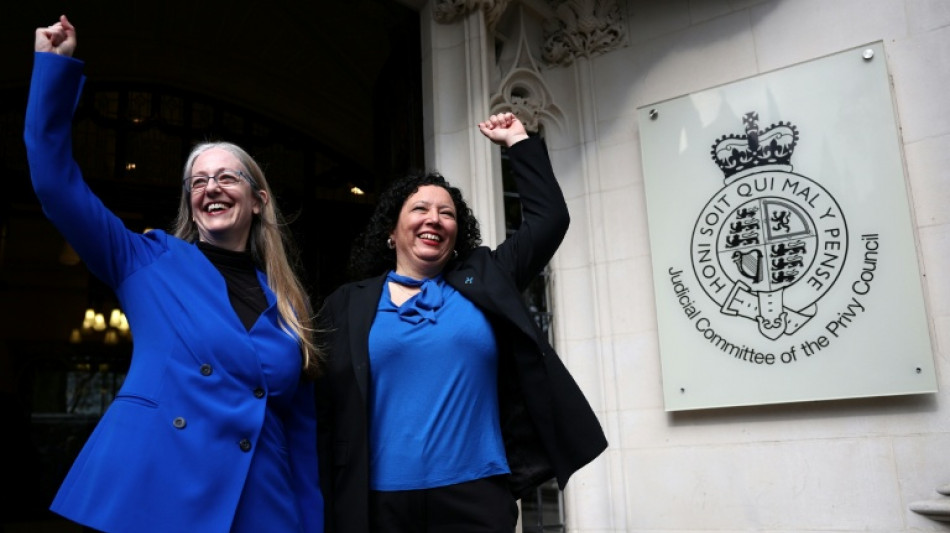

UK top court rules definition of 'woman' based on sex at birth
Britain's Supreme Court ruled Wednesday that the legal definition of a "woman" is based on a person's sex at birth, a landmark decision with far-reaching implications for the bitter debate over trans rights.
In a win for Scottish gender-critical campaigners who brought the case to the UK's highest court, five London judges unanimously ruled that "the terms 'woman' and 'sex' in the Equality Act 2010 refer to a biological woman, and biological sex".
However, the act also "gives transgender people protection" against discrimination in their acquired gender, Justice Patrick Hodge said in handing down the verdict.
The UK government welcomed the ruling for bringing "clarity" to the debate.
It is the culmination of a years-long battle between the Scottish government and the campaign group For Women Scotland (FWS) -- which launched an appeal to the Supreme Court after losing pleas in Scottish courts over an obscure legislation aimed at hiring more women in public-sector bodies.
Dozens of FWS and other gender-critical campaigners, who argue that biological sex cannot be changed, cheered the ruling, hugging and crying outside the court.
"This has been a really, really long ride," said Susan Smith, co-director of For Women Scotland, adding that the campaigners were "enormously grateful for this ruling".
"Today, the judges have said what we always believed to be the case: that women are protected by their biological sex," she said. "Women can now feel safe that services and spaces designated for women are for women".
Ahead of the verdict, trans rights activists raised concerns that a ruling in favour of FWS could risk discrimination against trans people in their chosen gender.
"The court is well aware of the strength of feeling on all sides which lies behind this appeal," Hodge said, recognising the fight of women against sex discrimination as well as a "vulnerable" position of the trans community.
- Single-sex spaces -
Scottish Greens activist and trans woman Ellie Gomersall, 25, told Sky News the ruling was "yet another attack on the rights of trans people to live our lives in peace".
She called on the Labour government "to step up, and defend one of the most vulnerable minorities in the country".
At the heart of the legal battle were clashing interpretations of the Equality Act.
While the Scottish government argued that the Equality Act (EA) gave trans women with a Gender Recognition Certificate (GRC) the same protections as a biological female, FWS disagreed.
In its judgement, the Supreme Court ruled that the devolved Scottish government's "interpretation is not correct" and that the Equality Act was inconsistent with the 2004 Gender Recognition Act that introduced GRC certificates.
The Equality and Human Rights Commission (EHRC), which is responsible for enforcing the Equality Act, said it was "pleased" the ruling addressed complicated issues of maintaining single-sex spaces.
Single-sex spaces and services including changing rooms, hostels and medical services "will function properly only if sex is interpreted as biological sex", the judgement said.
The Labour government said the ruling brought "clarity and confidence for women and service providers such as hospitals, refuges, and sports clubs".
"We have always supported the protection of single-sex spaces based on biological sex," a government spokesperson said.
Opposition Conservative leader Kemi Badenoch hailed the "victory" for FWS.
"Saying 'trans women are women' was never true in fact, and now isn't true in law either," Badenoch said.
- Online discourse -
The ruling will be a blow for transgender women and their ability to access single-sex spaces, a significant point of contention.
LGBTQ charity Stonewall said the ruling was "incredibly worrying for the trans community".
"Stonewall shares the deep concern at the widespread implications for today's ruling," its chief executive Simon Blake said.
The debate has been particularly vicious in the UK, pitting gender-critical activists against trans rights campaigners.
One of the most prominent supporters of gender-critical campaigns is "Harry Potter" author JK Rowling, who has been the target of hate and accused of transphobia.
The ruling also comes at a time when transgender rights are under threat in the United States under President Donald Trump.
Since retaking office, Trump has declared the federal government will recognise only two sexes, male and female; sought to bar trans athletes from women's sports; and curbed treatments for trans children.
The latest UK ruling could pile pressure on Prime Minister Keir Starmer, who has remained largely silent on trans issues since coming into power last July, to further clarify legislation.
S.Charpentier--PP






